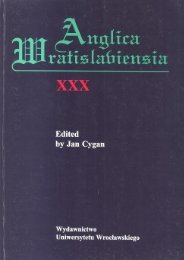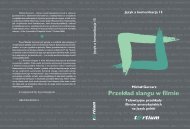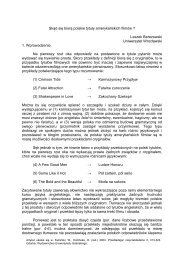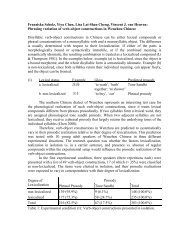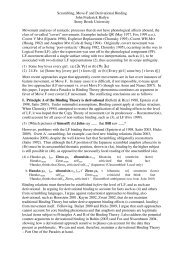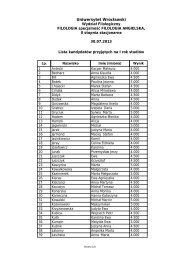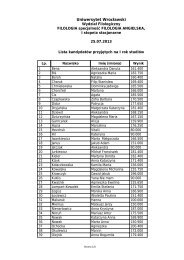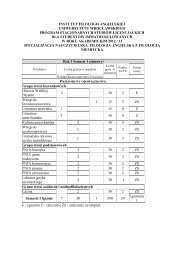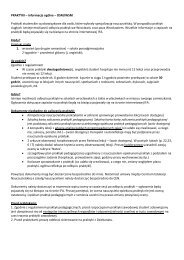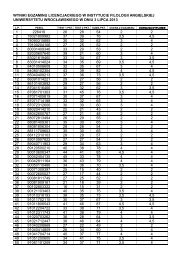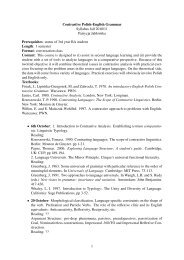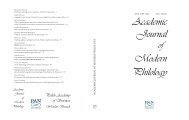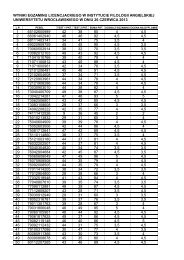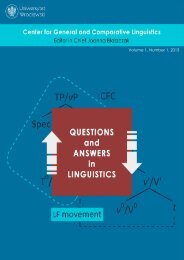Histories, societies, spaces of dialogue. Post-dependence studies in ...
Histories, societies, spaces of dialogue. Post-dependence studies in ...
Histories, societies, spaces of dialogue. Post-dependence studies in ...
Create successful ePaper yourself
Turn your PDF publications into a flip-book with our unique Google optimized e-Paper software.
debates on postcoloniality, social <strong>in</strong>equalities <strong>of</strong> late capitalism, and new social identities emerg<strong>in</strong>g from thesephenomena. It is important to do so with an adequate academic language capable <strong>of</strong> grasp<strong>in</strong>g these realitiesthrough theoretical categories compris<strong>in</strong>g a comparative perspective both <strong>in</strong> discipl<strong>in</strong>ary and <strong>in</strong> cultural terms.We <strong>in</strong>vite papers from across the humanities and social sciences, as well as transdiscipl<strong>in</strong>ary approachesrespond<strong>in</strong>g to the questions listed below:- strategies <strong>of</strong> deal<strong>in</strong>g with, codify<strong>in</strong>g, and (re-)<strong>in</strong>terpret<strong>in</strong>g the past (both recent and more distant) – nostalgia,sentimentality, willed and/or unconscious amnesia; post-1989 sites <strong>of</strong> commemoration/remember<strong>in</strong>g/forgett<strong>in</strong>g;- the center-periphery relation as diagnostic <strong>of</strong> the transform<strong>in</strong>g format and function <strong>of</strong> the state; theresurgence <strong>of</strong> the local and the discovery/recreation <strong>of</strong> multiple histories <strong>of</strong> the place;- narratives <strong>of</strong> historical breakthrough; <strong>in</strong>stances <strong>of</strong> “epistemic violence” connected with these breakthroughsor takeovers;- contemporary marg<strong>in</strong>alized groups emerg<strong>in</strong>g as a result <strong>of</strong> social stratification and the phenomenon <strong>of</strong> nonnormativeidentities, privileged and underprivileged groups <strong>in</strong> social narratives;- cultural and political complexities <strong>of</strong> the post-communist transition process;- the border status <strong>of</strong> Central and Eastern Europe as <strong>in</strong>scribed with<strong>in</strong> the project <strong>of</strong> European modernity;Western discourses on Eastern and Central Europe after communism and ambivalent attitudes toward the"new" Europe;- the effects <strong>of</strong> the mutual <strong>in</strong>tersect<strong>in</strong>g and overlay<strong>in</strong>g <strong>of</strong> these phenomena and processes.We propose to ground the <strong>in</strong>quiry <strong>in</strong>to the above-listed areas <strong>in</strong>to some larger theoretical categories, such as:<strong>Post</strong>-<strong>dependence</strong> <strong>studies</strong> – evaluation <strong>of</strong> the term, its theoretical apparatus, its comparative potential fordiagnos<strong>in</strong>g the socio-cultural situation <strong>of</strong> the countries <strong>of</strong> Central and Eastern Europe; <strong>Post</strong>-<strong>dependence</strong><strong>studies</strong> vis-à-vis postcolonialism and <strong>studies</strong> on postcommunism.The Other Europe – what significance has Philip Roth’s label today? The past and present mechanisms <strong>of</strong>construct<strong>in</strong>g the European “Other”. Self-other<strong>in</strong>g at work <strong>in</strong> post-communist/post-socialist countries <strong>of</strong>Central and Eastern Europe vis-à-vis the west?The <strong>Post</strong>colonial/ <strong>Post</strong>communist connection - Categories from postcolonial <strong>studies</strong> <strong>in</strong> historicaldiscourse and historiographic thought <strong>in</strong> Central and Eastern Europe; ideological uses <strong>of</strong> postcolonialcategories, especially as a new language for the national(ist) paradigm; theoriz<strong>in</strong>gpostcommunist/postsocialist transformation beyond the patroniz<strong>in</strong>g/didactic bias <strong>of</strong> development and othertheories <strong>of</strong> modernization; attitudes to real socialism <strong>of</strong> the left <strong>in</strong> the West; <strong>in</strong>tellectualresponsibility/accountability.
The affect <strong>of</strong> post-<strong>dependence</strong> – emotional aspects and the affective charge <strong>of</strong> postcommunist/post<strong>dependence</strong>transformation, social phenomena <strong>of</strong> nostalgia, melancholia, anger and frustration,ressentiment.(Un)translatability <strong>of</strong> cultural difference – difficulties <strong>in</strong> communicat<strong>in</strong>g cultural uniqueness/difference.Where does the object <strong>of</strong> <strong>in</strong>quiry resist translation <strong>in</strong>to theoretical/received paradigms? Effectivetranslational strategies for deal<strong>in</strong>g with cultural difference <strong>in</strong> the target language.Activat<strong>in</strong>g cultural memory - any study <strong>of</strong> the “post” situation becomes necessarily an adventure <strong>in</strong>spectrology – a knowledge <strong>of</strong> how the past lags <strong>in</strong> the present. What haunts current <strong>studies</strong> <strong>in</strong> post<strong>dependence</strong>,post-Soviet, post-socialism and so on? Re-member<strong>in</strong>g the forgotten/falsified past; strategies <strong>of</strong>cultural survival, remember<strong>in</strong>g and reconstruct<strong>in</strong>g memory <strong>in</strong> cultures <strong>of</strong> Central and Eastern Europe. (Non-)antagonistic relation between such social/cultural/political phenomena as commemorat<strong>in</strong>g, memory,remember<strong>in</strong>g.Challenges <strong>of</strong> transnationality and globalization – how do we br<strong>in</strong>g the multiple “posts” studied at themoment <strong>in</strong> the contexts <strong>of</strong> Central and Eastern Europe <strong>in</strong>to the force field <strong>of</strong> globalization? Revis<strong>in</strong>gmethodologies <strong>of</strong> critical th<strong>in</strong>k<strong>in</strong>g with<strong>in</strong> the area <strong>of</strong> history, culture, literary canons to build new viablecomparative models <strong>of</strong> <strong>in</strong>vestigation.Localism and globality – reflections <strong>in</strong> culture, politics and literature <strong>of</strong> Central and Eastern Europeancountries, vis-à-vis the <strong>in</strong>creas<strong>in</strong>g mobility and émigré population <strong>of</strong> the E-C European countries. Thehistories <strong>of</strong> local migrations, transregional communities and contacts, <strong>of</strong> Eastern European borderlands andtheir multicultural social tissue active long before the contemporary post-colonial, late-modernmulticulturalism; local and translocal cosmopolitanisms <strong>of</strong> “prov<strong>in</strong>cial Europe”; new migrations.Commonality <strong>of</strong> feel<strong>in</strong>gs and sensitivities - is there an Eastern European regional, transnationalsensibility/solidarity that allows us to see this category <strong>in</strong> terms <strong>of</strong> a subject <strong>of</strong> critical th<strong>in</strong>k<strong>in</strong>g, which wouldcorrespond with Arjun Apadurai’s idea <strong>of</strong> “community <strong>of</strong> sentiment” creat<strong>in</strong>g a new locality <strong>in</strong> global flows?Conference languages are English and Polish. Selected papers will be published <strong>in</strong> two books <strong>in</strong> respectivelanguages, which means that at least some <strong>of</strong> the texts will come out both <strong>in</strong> the orig<strong>in</strong>al language and <strong>in</strong>translation.Please send paper abstracts <strong>of</strong> ca. 300 – 500 words with keywords and a short bio- note by 30th November 2012to:d_kolodziejczyk@hotmail.comh.gosk@uw.edu.plThe organiz<strong>in</strong>g committee:Dr. Dorota Kołodziejczyk, University <strong>of</strong> Wrocław, Poland;Pr<strong>of</strong>. Hanna Gosk, Warsaw University, Poland;Pr<strong>of</strong>. Ewa Kraskowska, Poznań University, Poland;Dr. Crist<strong>in</strong>a Sandru, Literary Encyclopedia, UK.Pr<strong>of</strong>. Bożena Karwowska, University <strong>of</strong> British Columbia, Canada.



